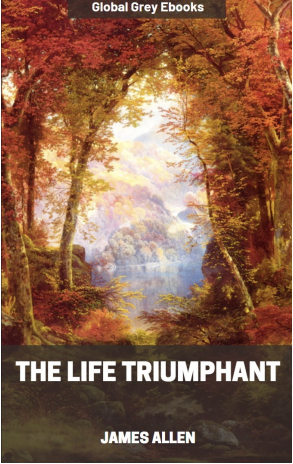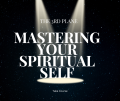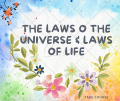

James Allen’s The Life Triumphant (1908) is a self-help book emphasizing the power of self-mastery to achieve a fulfilling life. Allen argues that inner peace and victory over life’s challenges stem from cultivating virtues like faith, courage, sincerity, and self-control, rejecting negative thinking and embracing a life guided by principles of goodness and truth. The book explores various aspects of moral development, suggesting that true strength lies in conquering internal weaknesses and aligning oneself with the cosmic order. Ultimately, Allen promotes a path to spiritual enlightenment through self-discipline and the pursuit of virtue.
- What is the core idea behind “The Life Triumphant,” and what does it mean to live a perfect life?
- The central idea of “The Life Triumphant” is that each individual creates their own mental world, and it is within their power to move from a place of suffering and sin to one of virtue, joy, and “perfection.” This “perfect life” isn’t some distant, impossible goal, but rather a very real and attainable state achieved through self-control, moral excellence, and a shift in one’s thinking. The book argues that we remain in states of suffering only by clinging to those conditions and that when one chooses to rise above their “dark dreams,” they can achieve a state of inner peace and strength.
- How does one develop faith and courage as the book suggests, and why are these qualities so crucial for achieving a triumphant life?
- Faith, in the context of “The Life Triumphant,” is about unwavering belief in a universal justice and goodness and that there is an inherent order to the universe, which also means that evil is not an ultimate force and that it can be overcome. Courage, in this context, stems from this faith, empowering a person to face life’s challenges head-on. These are crucial because the path to triumph involves battling inner weaknesses and negative tendencies, which requires belief in one’s inherent capacity for good and the fortitude to pursue this path despite setbacks.
- The book emphasizes “manliness” and “womanliness.” What is meant by these terms and what is their role in achieving a triumphant life?
- These terms don’t refer to gender stereotypes, but to the balance of moral strength and natural power. True manliness and womanliness embody sincerity, courage, and self-reliance, while rejecting weakness, artificiality, and hypocrisy. They are the foundation for understanding gentleness, purity, and patience which are considered “divine qualities.” To achieve a triumphant life, one needs to harness their natural energy and power for good, directing their passions as “servants,” not “masters,” avoiding excesses and instead channeling their animal nature toward noble purposes.
- What is the significance of self-control according to the text, and how does it relate to happiness?
- Self-control is presented as a key to transforming base inclinations into noble qualities, not through repression, but through constructive expression. It involves harnessing mental energy and focusing it towards virtuous ends, leading to the increase of personal and universal happiness. Self-control is the path to happiness; those who don’t control themselves are controlled by their passions, circumstances, and whims, leading to misery and dependence on external things for fleeting pleasure. True and permanent happiness comes from commanding one’s self.
- What are the main points of achieving simplicity and freedom?
- Achieving simplicity and freedom requires a process of mental and spiritual housecleaning; discarding the “mental rubbish” that clutters the mind – complex theories, insatiable desires, and negative thoughts – to focus on fundamental principles, especially love and virtue. This does not mean thinking less but directing thought to a high and useful purpose, leading to a state where one acts without confusion or conflict. This simplicity, by ridding one’s mind of the superfluous, frees one to live in the present moment, rooted in truth, and unburdened by doubt or fear.
- How does “right thinking” contribute to inner peace, and what distinguishes a right thinker from a wrong thinker?
Right thinking, according to the book, is the root of all good habits and a right life. It’s about taking charge of one’s thought process, actively choosing what to think and thereby directing one’s actions towards a fixed purpose rather than being controlled by impulses. A wrong thinker is defined by their lack of control over their thoughts, resulting in vices, unrest, and being ruled by external events. A right thinker cultivates logical, harmonious, and virtuous thoughts, establishing a life on a foundation of knowledge and thus living in a state of profound repose and understanding.
- Why is calmness so important, and how does one develop inner calmness?
- Calmness is a direct result of self-conquest and is seen as an indispensable quality for a triumphant life. It represents the absence of hurry, excitement, anxiety, and fear, allowing for true influence, power, and joy. Calmness is not about avoiding strong feelings, but about mastering them, controlling and directing passions, and gaining self-possession. One develops inner calmness by abandoning excitements and distractions and fortifying themselves in virtuous practice. It’s a process of gradual self-improvement through daily efforts to master one’s weaknesses.
- What is the role of “insight” in achieving a triumphant life, and how does it relate to nobility?
- Insight represents a deep understanding of the principles that govern existence, born from the pursuit of virtue and a refined understanding of cause and effect. Insight is the understanding of good and evil to such a depth that one chooses only good. It’s not merely intellectual, but is manifested as a ripeness of character marked by a combination of strength, intellect, gentleness, and wisdom. It empowers one to see beyond personal concerns to recognize the good in all things, leading to nobility and unwavering goodness, thus fixing the mind in love and the practice of virtue.
The Life Triumphant: A Study Guide
Short Answer Quiz
- According to Allen, what is the basis of all joys and sorrows?
- What, according to Allen, is man’s divine destiny?
- What does Allen say is the relationship between evil and misery?
- What does Allen say is the relationship between animal force and divinity?
- How does Allen describe a “manly man?”
- How does Allen describe the relationship between self-control and happiness?
- According to Allen, what is the main distinction between a wise man and a fool?
- What is the relationship between virtue and knowledge according to Allen?
- What is the effect of calmness on the mind?
- What, according to Allen, is the difference between self-consciousness and divine consciousness?
Short Answer Quiz Answer Key
- All joys and sorrows are creations of the mind and dependent on the mind for their existence. An individual’s mental world determines their experiences.
- Man’s divine destiny is to triumph over every inward foe, to arrive at wisdom and bliss, and not to be defeated or cast out. This goal is achievable through self-control and moral excellence.
- Allen states that evil and misery are related as cause and effect; where there is evil there will be misery. Likewise, good and gladness are related as cause and effect.
- Allen states that the animal force within us, when controlled and rightly directed, endows us with divine strength and allows us to achieve the highest victories of true living.
- Allen describes a “manly man” as one who blends unbending strength with yielding kindness, honors others while respecting himself, walks his own path without interfering with others, and possesses an iron will combined with tender sympathy.
- Allen asserts that self-control is directly proportional to happiness, where increased self-control leads to increased happiness and a lack of self-control results in misery.
- The fundamental difference between the wise man and a fool is that the wise man controls his thinking, while the fool is controlled by his thoughts, allowing external things to dictate his actions.
- Allen says that knowledge and virtue are inextricably linked. True knowledge, the knowledge that leads to wisdom, comes from the practice of virtue. Separating knowledge from virtue results in a loss of true wisdom.
- Calmness is the radiant light which adds a luster to all the virtues; it is the byproduct of self-conquest and leads to greater strength, influence, power, and joy.
- Self-consciousness focuses on the self, its preservation, and personal gains, while divine consciousness is concerned with humanity, the universe, and eternal truths, and has surpassed the preoccupation with the individual.
Essay Questions
- Explore James Allen’s concept of “The Life Triumphant.” How does he define it, what are its key components, and what is the path to achieving it according to Allen’s philosophy?
- Analyze the role of self-control in Allen’s work. How does Allen describe self-control? Why is it so essential to the attainment of a fulfilling life, and what are the consequences of lacking self-control?
- Discuss the relationship between individual responsibility and cosmic law according to Allen. How does an individual’s inner state impact their outer world? How does justice figure into this relationship?
- Compare and contrast Allen’s concepts of ‘manliness’ and ‘womanliness’ to contemporary ideas of gender roles. What are the key attributes of each, and how do they relate to achieving the Life Triumphant?
- Trace the evolution of consciousness according to James Allen’s ideas, from self-consciousness to divine consciousness. What are the characteristics of each, and what is the role of self-mastery in this transformative process?
Glossary of Key Terms
- Life Triumphant: The state of overcoming all inward struggles and achieving a life of wisdom, bliss, and victory over self.
- Self-Control: The ability to direct one’s own thoughts, emotions, and actions; not merely suppression but a transmutation of lower inclinations into higher qualities.
- Moral Excellence: A state of character characterized by goodness, integrity, and adherence to high ethical standards; a cornerstone of a virtuous life.
- Cosmic Order: The idea that the universe is governed by a natural and just order, not chaos, and is not inherently evil.
- Animal Force: The primal energy and passions within a person that can be destructive if uncontrolled, but can be harnessed for divine strength.
- Manliness/Womanliness: The inherent strengths and virtues specific to each gender, in their ideal form, before they can reach true godliness.
- Sincerity: The state of being genuine, honest, and free from hypocrisy. Necessary for growth and meaningful connection.
- Energy/Power: Inner potential that needs to be focused, not dissipated, to be useful; directed toward good to achieve wisdom.
- Right Thinking: The practice of controlling and directing thoughts towards virtue, logic, and truth; essential to a right and victorious life.
- Repose: A state of calmness and peace of mind achieved through self-mastery and alignment with truth; is synonymous with wisdom and contentment.
- Insight: Deep understanding gained through virtue and self-purification; enables one to see the nature of good and evil and choose good, thus revealing truth.
- Self-Consciousness: A state of being preoccupied with the self, including personal desires, fears, and anxieties; a state that Allen says must be overcome.
- Divine Consciousness: A state of awareness that transcends personal concerns and embraces universal truths; marked by wisdom, compassion, and freedom from suffering.
- Self-Mastery: The process of controlling one’s own nature through self-discipline, ultimately leading to self-transformation and the conquest of self.






















0 responses on "The Life Triumphant"